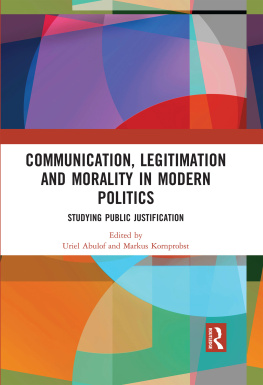Communication, Legitimation and Morality in Modern Politics
Why? This question drives scientific inquiry, not least in the social sciences: why war, revolution, racism and inequality? Asking and debating about why?, however, is not the prerogative of scholars; social actors, endowed with thought, reflection and speech, do it too. While we all dance to the beat of genes, emotions, identities and habituated norms, we occasionally stop to ask why? The social sciences have been long preoccupied with the ostensibly objective why while sidelining the social, intersubjective why? This book focuses on the latter, analysing the social actors search for justification in their public, political sphere. Justifications, broadly understood, are answers to why-questions given and debated by social actors. The chapters focus on public justifications. While the contributors do not submit that private encounters addressing why-questions do not matter, they choose to put public encounters addressing these questions under scrutiny. Given the ongoing telecommunications revolution, and new political practices associated with it, these public encounters become increasingly pertinent in our evolving political orders.
This book originally published as a special issue of Contemporary Politics.
Uriel Abulof is a Senior Lecturer of Politics, teaching at Tel-Aviv University, Israel, and Princeton University, USA. He is the author of The Mortality and Morality of Nations (2015) and Living on the Edge: The Existential Uncertainty of Zionism (2016), which won Israels best academic book award (Bahat Prize). His articles have appeared in journals such as International Studies Quarterly, International Political Sociology, Nations and Nationalism, British Journal of Sociology, European Journal of International Relations, Ethnic and Racial Studies, and International Politics.
Markus Kornprobst holds the Chair in International Relations at the Diplomatic Academy of Vienna, Austria. He previously taught at the School of Public Policy at University College London and Magdalen College at Oxford University, UK. His research appears in leading journals in the discipline, such as International Organization, European Journal of International Relations, International Studies Review, Review of International Studies, and Millennium. He is the author of Irredentism in European Politics and co-editor of Metaphors of Globalization.
Communication, Legitimation and Morality in Modern Politics
Studying Public Justification
Edited by
Uriel Abulof and Markus Kornprobst
First published 2018
by Routledge
2 Park Square, Milton Park, Abingdon, Oxon, OX14 4RN, UK
and by Routledge
711 Third Avenue, New York, NY 10017, USA
Routledge is an imprint of the Taylor & Francis Group, an informa business
2018 Taylor & Francis
All rights reserved. No part of this book may be reprinted or reproduced or utilised in any form or by any electronic, mechanical, or other means, now known or hereafter invented, including photocopying and recording, or in any information storage or retrieval system, without permission in writing from the publishers.
Trademark notice: Product or corporate names may be trademarks or registered trademarks, and are used only for identification and explanation without intent to infringe.
British Library Cataloguing in Publication Data
A catalogue record for this book is available from the British Library
ISBN 13: 9781138554948
Typeset in Myriad Pro
by RefineCatch Limited, Bungay, Suffolk
Publishers Note
The publisher accepts responsibility for any inconsistencies that may have arisen during the conversion of this book from journal articles to book chapters, namely the possible inclusion of journal terminology.
Disclaimer
Every effort has been made to contact copyright holders for their permission to reprint material in this book. The publishers would be grateful to hear from any copyright holder who is not here acknowledged and will undertake to rectify any errors or omissions in future editions of this book.
Contents
Citation Information
The chapters in this book were originally published in Contemporary Politics, volume 23, issue 1 (March 2017). When citing this material, please use the original page numbering for each article, as follows:
Introduction
Introduction: the politics of public justification
Uriel Abulof and Markus Kornprobst
Contemporary Politics, volume 23, issue 1 (March 2017), pp. 118
Chapter 1
A psychological perspective on moral reasoning, processes of decision-making, and moral resistance
Elliot Turiel
Contemporary Politics, volume 23, issue 1 (March 2017), pp. 1933
Chapter 2
Conscientious politics and Israels moral dilemmas
Uriel Abulof
Contemporary Politics, volume 23, issue 1 (March 2017), pp. 3452
Chapter 3
The fusion of the private and public sectors
Amitai Etzioni
Contemporary Politics, volume 23, issue 1 (March 2017), pp. 5362
Chapter 4
Empirical legitimation analysis in International Relations: how to learn from the insights and avoid the mistakes of research in EU studies
Achim Hurrelmann
Contemporary Politics, volume 23, issue 1 (March 2017), pp. 6380
Chapter 5
The public valuation of religion in global health governance: spiritual health and the faith factor
Tine Hanrieder
Contemporary Politics, volume 23, issue 1 (March 2017), pp. 8199
Chapter 6
Arguing deep ideational change
Markus Kornprobst and Martin Senn
Contemporary Politics, volume 23, issue 1 (March 2017), pp. 100119
Chapter 7
Caveat: addressing public justification as an empirical phenomenon
Liah Greenfeld
Contemporary Politics, volume 23, issue 1 (March 2017), pp. 120125
Chapter 8
Unpacking public justification
Uriel Abulof and Markus Kornprobst
Contemporary Politics, volume 23, issue 1 (March 2017), pp. 126133
For any permission-related enquiries please visit:
http://www.tandfonline.com/page/help/permissions
Notes on Contributors
Uriel Abulof is a Senior Lecturer of Politics, teaching at Tel-Aviv University, Israel, and Princeton University, USA. He is the author of The Mortality and Morality of Nations (2015) and Living on the Edge: The Existential Uncertainty of Zionism (2016), which won Israels best academic book award (Bahat Prize). His articles have appeared in journals such as International Studies Quarterly, International Political Sociology, Nations and Nationalism, British Journal of Sociology, European Journal of International Relations, Ethnic and Racial Studies, and International Politics.
Amitai Etzioni is a Professor of International Affairs at the George Washington University, USA. He previously served as a Senior Advisor at the Carter White House; taught at Columbia University, Harvard University, and the University of California at Berkeley; and served as the President of the American Sociological Association.









